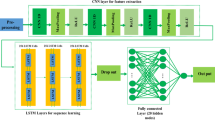Abstract
Load forecasting is the main exploration field in the smart grid technologies. The classification of load forecasting depends on its target forecasting that ranges from minutes to years. Residential smart home load forecasting focuses on forecasting energy consumption of smart homes which is crucial when it comes to energy conservation and load management issues. This paper focuses on application and implementation of deep learning algorithm known as long short-term memory (LSTM) that predicts the load of residence hours or days ahead and the time series load analysis of the houses will be presented.
Access this chapter
Tax calculation will be finalised at checkout
Purchases are for personal use only
Similar content being viewed by others
References
Agana, N. A., Oleka, E., Awogbami, G., & Homaifar, A. (2018). Short-term load forecasting based on a hybrid deep learning model. In: Conference on Proceedings—IEEE SOUTHEASTCON (Vol. 2018-April, pp. 1–6).
Hosein, s., & Hosein, P. (2017). Load forecasting using deep neural networks. In Conference on Innovative Smart Grid Technologies. IEEE Power & Energy Society, ISGT 2017.
Joshi, M., & Singh, R. (2017). Short-term load forecasting approaches : A review. 01, 9–17.
Kong, K., et al. (2017). Short-term residential load forecasting based on LSTM recurrent neural network (Vol. 3053, No. c, pp. 1–11).
Mohammad, Y.-C. K. F., & Lee, K.-B. (2013). Short term load forecasting using deep neural networks (Vol. 3, No. 2, pp. 1–9).
Shrestha, A. (2019). Review of deep learning algorithms and architectures. IEEE Access, 7, 53040–53065. Smart—UMass trace repository. https://traces.cs.umass.edu/index.php/Smart/Smart. Accessed July 31, 2019.
Wang, Y., Chen, Q., Hong, T., Kang, C., & Mar, C. Y. (2017). Review of smart meter data analytics : Applications, methodologies, and challenges, no. June (pp. 1–24).
Yildiz, B., Bilbao, J. I., Dore, J., & Sproul, A. B. (2017). Recent advances in the analysis of residential electricity consumption and applications of smart meter data. Applied Energy, 1–25.
Zhang, X. M., Grolinger, K., & Capretz, M. A. M. (2018). Forecasting residential energy consumption using support vector regressions, no. January 2019 (pp. 2006–2007).
Author information
Authors and Affiliations
Corresponding author
Editor information
Editors and Affiliations
Rights and permissions
Copyright information
© 2021 The Author(s), under exclusive license to Springer Nature Switzerland AG
About this paper
Cite this paper
Araya, S., Rakesh, N., Kaur, M. (2021). Smart Home Load Analysis and LSTM-Based Short-Term Load Forecasting. In: Singh, P.K., Polkowski, Z., Tanwar, S., Pandey, S.K., Matei, G., Pirvu, D. (eds) Innovations in Information and Communication Technologies (IICT-2020). Advances in Science, Technology & Innovation. Springer, Cham. https://doi.org/10.1007/978-3-030-66218-9_14
Download citation
DOI: https://doi.org/10.1007/978-3-030-66218-9_14
Published:
Publisher Name: Springer, Cham
Print ISBN: 978-3-030-66217-2
Online ISBN: 978-3-030-66218-9
eBook Packages: Earth and Environmental ScienceEarth and Environmental Science (R0)




